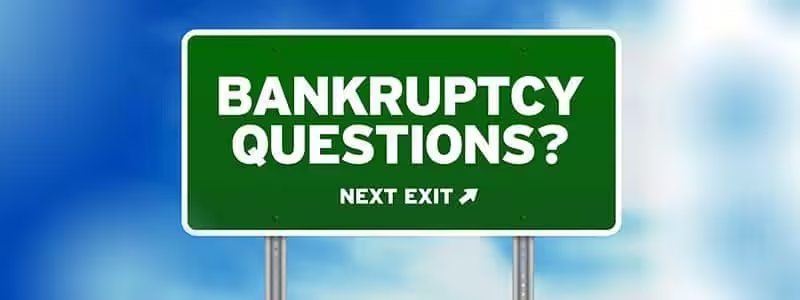
Filing for bankruptcy is a complicated process; just acquiring a basic understanding on how to file for bankruptcy seems daunting. And naturally, anyone considering bankruptcy will have many questions.
Below you will find a list of some of the most common bankruptcy questions and answers.
A Word of Warning before we Begin
Please keep in mind this is a general overview of common bankruptcy questions. Bankruptcy is fact specific, so the answers to your questions will vary depending on the prospective filer(s) income, expenses, assets, debts, and other factors. No two cases are alike.
It would be in your best interest to contact a Clearwater bankruptcy lawyer before making any major decisions. Sometimes bankruptcy can be avoided all together.
Fill out the form to the right. I’ll conduct a free consultation and review your case to help you understand how to file for bankruptcy.
Who is eligible to file for bankruptcy?
Generally speaking, any individual, married couple, or business carrying debt may file a petition for bankruptcy. Even municipalities can file bankruptcy, like the city of Detroit. But in some circumstances, the commitments required by bankruptcy may exceed the benefits.
What is the minimum amount of debt I must have before I am eligible to file bankruptcy?
There is no minimum amount of debt to file for bankruptcy. However, if the debt is low enough, then bankruptcy may be overkill.
For example, if you have few assets and little or no property, creditors may be unable to collect the debt, so resorting to bankruptcy is unnecessary.
Or if your financial challenges are temporary or if it’s a small amount of debt, settling your debts with each creditor may be a better option than filing for bankruptcy.
How often can I file bankruptcy?
Sometimes it is necessary for the same person to file bankruptcy more than once. To receive a “discharge” in a subsequent chapter 7 case (which is the legal terms for wiping out your liability on the debts), you have to wait eight years after a previous filing for Chapter 7, or six years after a previous filing for Chapter 13.
With Chapter 13, the wait period is shorter. You can file for Chapter 13 just two years after your previous filing for Chapter 13 and four years after your previous filing for Chapter 7.
You can also file a chapter 13 bankruptcy immediately after receiving a discharge in chapter 7, but in the chapter 13 bankruptcy you would not receive a discharge. Bankruptcy attorneys call this a “Chapter 20.” There are some strategic reasons why this may be a good approach, such as when a debtor is addressing mortgage loan modification, student loans, and taxes.
Which Chapter of bankruptcy would be better for me to file?
Unfortunately, this question is a little too complicated for this short Q&A. The answer turns on the debtor’s income, expenses, assets, debts, and other factors.
A bankruptcy lawyer can help you decide which Chapter will work better for you as well as help you understand your obligations once bankruptcy is filed.
Can I switch from filing for one Chapter of bankruptcy to another?
Sometimes yes. After you have filed under one chapter, you may be allowed to switch, but you will have to explain to the judge why you want to switch.
There can be good reasons to switch chapters in the middle of a bankruptcy. For example, a filer may start off in a repayment plan form of bankruptcy, and their income may drop to force them into a different chapter. Ultimately it will be the judge’s decision as to whether you are allowed to switch. Also, you have to be eligible for the type of bankruptcy to which you are converting.
Can all types of debt be discharged?
No. Although most debts are discharged in bankruptcy, there are some exceptions. Certain debts cannot be discharged, depending on which Chapter of bankruptcy you file. The following debts are just a few examples of what cannot be dismissed in most cases:
- Certain debts for taxes;
- Debts owed for spousal support or child support;
- Debts for that were fraudulently attained;
- Debts for criminal restitution;
- Debts that are reaffirmed in bankruptcy;
- Debts not listed in the schedule of debts;
Do I have to file bankruptcy on every debt I owe?
Every debt that you owe must be listed in your petition and debt schedule so that the court has a record of it.
You may choose to keep specific debts by reaffirming those debts during the bankruptcy process.
How do I let my creditors know that I have filed for bankruptcy?
Once you file for bankruptcy, the court will notify all creditors of your situation.
The court will notify creditors via mail of your case number, the automatic stay in place, the target date for the creditor meeting, and the deadline for the creditor to file an objection.
Other information may be included depending of the type of bankruptcy involved.
Can I alter my credit report to remove a bankruptcy?
No, bankruptcies will stay on a credit report for seven to ten years after being filed.
However, you may file an explanation with credit reporting agencies to offer a brief description of the circumstances behind your bankruptcy. This will not necessarily improve your credit score, but it will give you a chance to explain your bankruptcy to future creditors.
Further, while bankruptcy does impair credit, keep in mind that you will simultaneously be eliminating your liability on debts, so that will improve credit scores. Often, bankruptcy filers will see a net gain in their credit score within 1-2 years.
What are the first steps for filing for bankruptcy?
The very first thing you should do is consult a bankruptcy lawyer. You can use the form to the right to schedule a free consultation.
You need to make sure bankruptcy really is the best option. If you and your lawyer determine it is the only option, you’ll need to start gathering certain documentation (a list all of your debts–past and present–as well as your liabilities and assets).
This list is by no means exhaustive, so please contact me using the form at the right with any further questions that you have.






